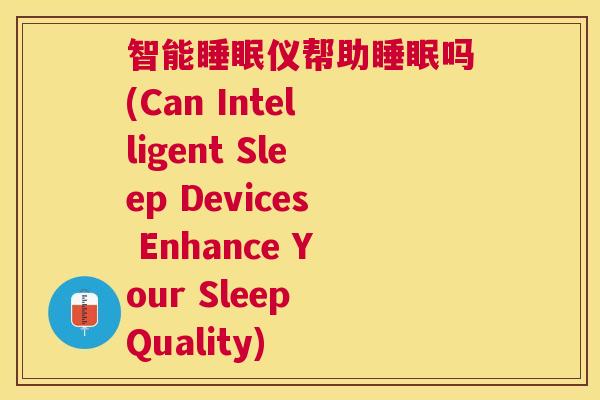智能睡眠仪帮助睡眠吗(Can Intelligent Sleep Devices Enhance Your Sleep Quality)
Introduction
Intelligent sleep devices, designed to optimize sleep quality, have gained significant attention in recent years. These devices promise to monitor, analyze, and enhance sleep patterns through advanced technology. But do they truly deliver on their promise of better sleep? Let's delve into the world of intelligent sleep devices to explore their effectiveness and impact on sleep quality.
The Role of Intelligent Sleep Devices
Intelligent sleep devices encompass a range of technologies, from wearable trackers to smart mattresses and ambient sensors. These devices work by collecting data while you sleep, including heart rate, breathing patterns, movement, and environmental factors like room temperature and noise levels. This data is then analyzed to provide insights into your sleep quality and patterns.
One key role of these devices is to help identify issues that disrupt sleep, such as frequent awakenings, irregular breathing, or environmental disturbances. By tracking these factors, intelligent sleep devices aim to pinpoint underlying causes of poor sleep and offer personalized recommendations for improvement.
Understanding Sleep Metrics
Central to the function of intelligent sleep devices are the metrics they use to assess sleep quality. These metrics often include sleep duration, sleep stages (such as light, deep, and REM sleep), sleep efficiency, and interruptions. For instance, a device might indicate how much time you spend in each sleep stage and how restful your sleep was overall.
With this data, users can gain insights into their sleep patterns over time. By identifying trends and correlations, individuals can make informed decisions to optimize their sleep hygiene and habits.

The Promise of Sleep Optimization
Intelligent sleep devices aim to go beyond mere data collection, offering actionable insights to improve sleep quality. For example, based on detected patterns, these devices might recommend adjusting bedtime routines, optimizing room conditions, or even suggest specific relaxation techniques.
The promise is that by leveraging technology, individuals can take proactive steps towards better sleep, potentially leading to improved overall health and well-being.
Evaluating Effectiveness
Despite the advancements in technology, questions remain about the effectiveness of intelligent sleep devices. While they provide detailed metrics and recommendations, the real-world impact on sleep quality varies among users.
Factors such as individual differences in sleep physiology, comfort with wearing devices during sleep, and the accuracy of data interpretation can influence outcomes. Some users report significant improvements in sleep quality after using these devices, while others see minimal change or find the recommendations impractical.
Challenges and Limitations
Intelligent sleep devices also face challenges and limitations. For instance, reliance on technology for sleep improvement may overlook broader lifestyle factors that impact sleep, such as stress, diet, or underlying health conditions.
Moreover, the accuracy and reliability of sleep tracking can be a concern. Variability in sensor performance or data interpretation may lead to inaccurate conclusions about sleep quality, potentially misleading users.
The Future of Sleep Technology
Despite these challenges, the field of intelligent sleep devices continues to evolve. Innovations in sensor technology, artificial intelligence, and data analytics hold promise for more accurate and actionable insights.
As these technologies mature, the integration of sleep devices into comprehensive health and wellness ecosystems could provide a more holistic approach to sleep optimization, addressing individual needs and circumstances.
Conclusion
Intelligent sleep devices represent a fascinating intersection of technology and sleep science. While they offer exciting possibilities for understanding and enhancing sleep, their true impact on sleep quality depends on various factors. As the field progresses, it will be essential to critically evaluate these devices' effectiveness and explore how they can best support healthy sleep habits and overall well-being.






